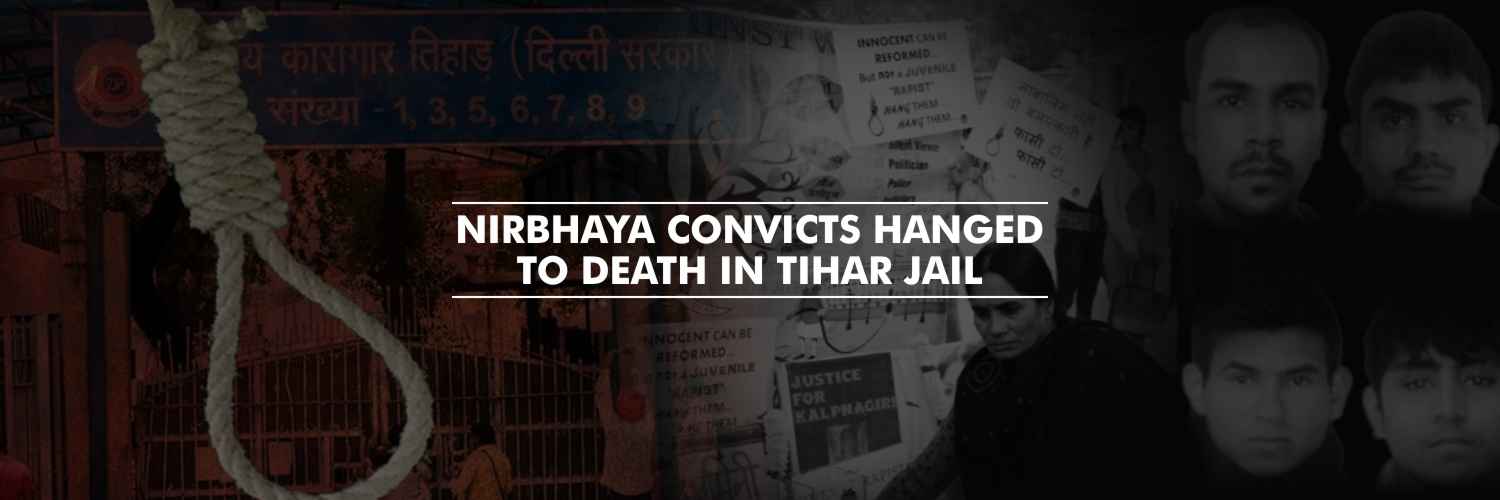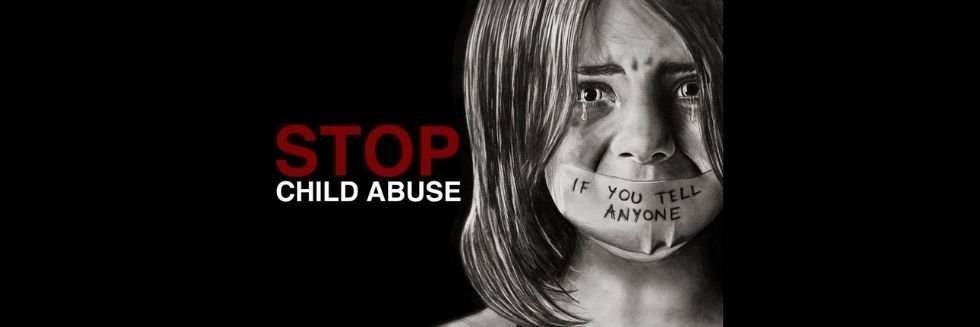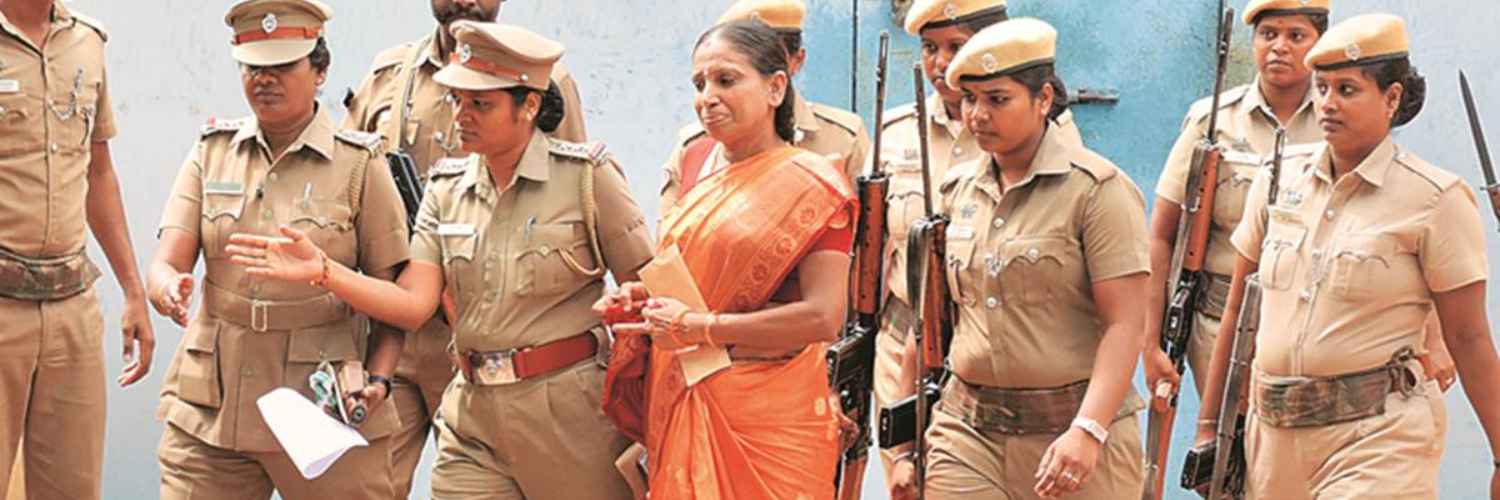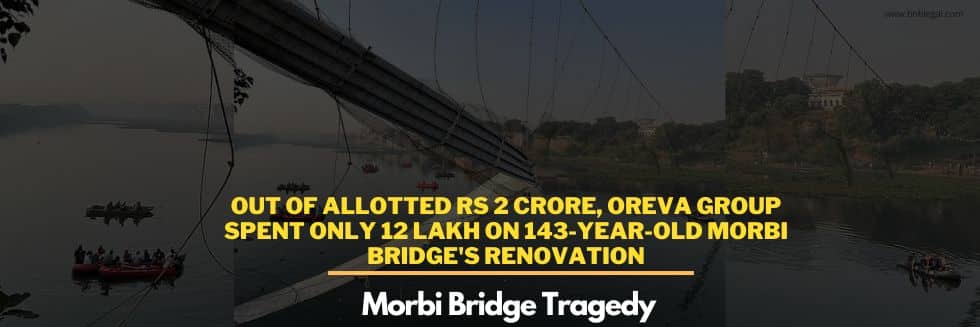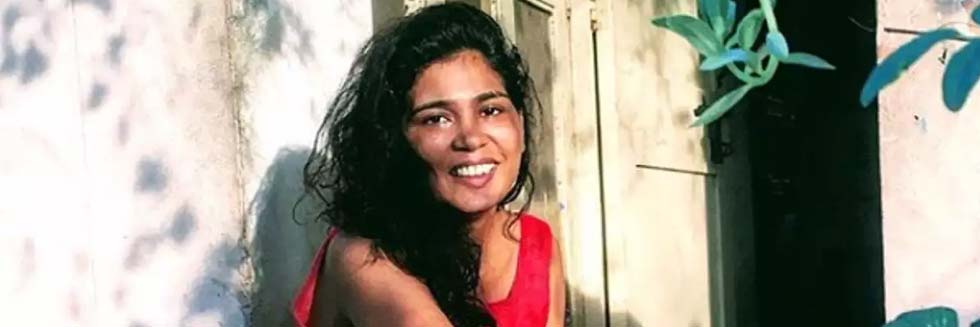All the four convicts in the 2012 Nirbhaya gangrape and murder case, Akshay Kumar, Pawan Gupta, Vinay Sharma, and Mukesh Singh, have been executed today in the early hours at 5:30 AM in Tihar Jail. The Director-General of Tihar jail, Sandeep Goel has confirmed the same to the media outside the jail premises, after a doctor has examined and declared all four dead. The Jail officials said the bodies were moved to Deen Dayal Upadhyay Hospital for autopsy.
The convicts were executed after the Delhi High Court and the Supreme Court rejected their petitions seeking a stay on their execution, in the midnight hearing of 19th and 20th March.
The Supreme Court heard the matter at night wherein the convict Pawan’s juvenility claim was raised along with the claim that the second mercy was rejected by the President in a bonafide manner. However, in the late-night hearing that began at 2:30 am and lasted an hour, the Supreme Court bench dismissed Pawan’s last plea, paving the way for the execution.
As per sources, on 16 March, three of the four convicts in the case Akshay Thakur, Pawan Gupta, and Vinay Sharma have reportedly approached the International Court of Justice (ICJ) and has sought to stay their execution.
The Tihar Jail officials had stated that the four convicts were told to prepare their wills and make a final wish, but until late Thursday night, they did not inform the authorities about their wishes or a will. As per officials, their belongings and money they earnt during their stay in jail will be handed over to their respective family members.
Subsequently, in the evening, the relatives of the four convicts came to meet them in the prison and guarded round-the-clock by prison guards. The four convicts refused to have their breakfast, before being taken to the gallows and even refused to take a bath.
As per jail officials, before the convicts were taken to the gallows, convict Vinay pleaded with jail officials and sought forgiveness. Earlier in February, he had attempted to hurt himself by banging his head against a wall, in his cell.
The execution was carried out by hangman Pawan Jallad. The jail superintendent, deputy superintendent, the resident medical officer, the District Magistrate and another jail staff member were the only people who witnessed the hanging.
“Today we got justice, this day is dedicated to the daughters of the country. I thank the judiciary & government. Justice delayed, but not denied,” stated Asha Devi, the mother of 2012 Delhi gang-rape victim, Nirbhaya, after the hanging.
As per sources, hundreds of people gathered outside Tihar Jail in the early hours of Friday, carrying the national flag and raising slogans of ‘long live Nirbhaya’ and ‘Bharat Mata ki Jai’. Some of them even distributed sweets after the four convicts were executed.
This is the first time in independent India’s history, that four convicts were hanged simultaneously, in Tihar Jail.
Prime Minister Narendra Modi, after the hanging, has taken to Twitter stating, “Justice has prevailed.”
On the other hand, the International Commission of Jurists has today, condemned the hanging of the four men convicted for Nirbhaya’s gangrape and murder while stating that the execution of the perpetrators was an “affront to rule of law and does not improve access to justice for women.”
The Incident
On 16 December 2012, at around 8:30 PM, a 23-year-old physiotherapy student, Nirbhaya and her male friend took a chartered bus to their home after watching the film ‘Life of Pi’. While the bus was moving, a group of men stole the victim and her friend’s belongings, then took the victim, Nirbhaya to the back of the bus brutally raped and assaulted her. Reportedly, the men beat the friend and each raped the woman in turn, before assaulting her viciously with an iron instrument. As per the court documents, the accused had inserted an iron rod, causing severe damage to her intestines and threw her out of the moving bus.
After raping and brutalizing Nirbhaya, the men, one of whom was a juvenile at the time, dumped her on the road and left for dead on the cold winter night. Her friend, who was with her, was also severely beaten, stripped and left on the road. As per sources, the accused then tried to run the bus over the victims. They then cleaned the bus with the victims’ clothes, before burning them.
Nirbhaya died two weeks after the attack in a Singapore hospital, where she was airlifted in a critical condition with serious injuries to her body and brain.
The trial
Six men were arrested for the brutal attack.
- Mukesh Singh – Part-time bus driver and cleaner
- Vinay Sharma – Gym trainer
- Ram Singh – Bus driver
- Akshay Thakur – Bus cleaner
- Pawan Gupta – A fruit seller
- Mohammad Afroz – Juvenile
One of the accused Ram Singh committed suicide in March 2013, days after the trial began in Tihar jail, where he was in custody. Another accused who was aged 17 at the time of the incident, was released in 2015, after serving three years in a juvenile correctional facility, the maximum term possible for a juvenile in India.
The remaining four convicts were granted a death sentence by the trial court which was later upheld by the High Court. Further, in 2017, the Supreme Court upheld death sentences for the four men, with the bench ruling the crime as the ‘rarest of the rare’ standard required to justify capital punishment in India.
Also, the mercy pleas filed by the four convicts were rejected by the President of India, after their Curative Petitions were dismissed by the Supreme Court.
In a BBC documentary, one of the four convicts, Mukesh Singh said “A decent girl won’t roam around at nine o’clock at night. A girl is far more responsible for rape than a boy. Housework and housekeeping are for girls, not roaming in discos and bars at night doing wrong things, wearing wrong clothes. About 20% of the girls are good.”
Mukesh went on to say “The death penalty will make things even more dangerous for girls. Now when they rape, they won’t leave the girl as we did. They will kill her. Before, they would rape and say, ‘Leave her, she won’t tell anyone.’ Now when they rape, especially the criminal types, they will just kill the girl.”
Meanwhile, one of the lawyer ML Sharma who appeared for the convicts stated during the BBC interview which was telecasted in the name of India’s Daughter “In our society, we never allow our girls to come out from the house after 6:30 or 7:30 or 8:30 in the evening with an unknown person.” “You are talking about men and women as friends. Sorry, that doesn’t have any place in our society. We have the best culture. In our culture, there is no place for a woman,” he added.
The other lawyer, AP Singh who also appeared for the convicts during one of his interviews had said: “If my daughter or sister engaged in pre-marital activities and disgraced herself and allowed herself to lose face and character by doing such things, I would most certainly take this sort of sister or daughter to my farmhouse, and in front of my entire family, I would put petrol on her and set her alight.”
Changes brought to Indian Rape Laws
On 21 March 2013, the Indian Criminal Law Act was amended, to provide tougher anti-rape laws. The Criminal Law (Amendment) Act, 2013 provided rigorous imprisonment and even death sentence for rape convicts besides stringent punishment for offenses like acid attacks, stalking and voyeurism. The law, for the first time, defined stalking and voyeurism as non-bailable offenses if repeated for a second time.
The 2013 amendment made changes not only to the Code of Criminal Procedure but also to various sections of the Indian Penal Code, the Indian Evidence Act and the Protection of Children from Sexual Offences Act.
The amendment has further provided granting death sentences to repeat offenders for such crimes. It also defined acid attack as a crime besides granting a victim the right to self-defense alongside imposing a minimum 10-year jail term for perpetrators of such acts.
Further, the amendment provides provisions for a minimum jail term of seven years which may extend to imprisonment for natural life, and a fine for rape convict if he is found to be a police officer, a public servant, armed forces personnel or management or hospital staff. However, even after the above amendment to Criminal laws and stringent provisions, the poor policies and implementation have made it a failure for their appliance in our country, where rape is considered to be the fourth most common crime.
Other similar crimes
Hyderabad veterinary doctor: Earlier on 29 November 2019, four men were arrested in Hyderabad for allegedly raping and killing a woman by smothering her and later burning her body, an incident that led to widespread outrage. All the four accused were encountered when they were accompanied to the crime scene for re-construction of the crime at around 3 AM on 6 December. As per the police officials, the four accused snatched the weapons from the police personnel and initiated firing, the police had to cross-fire. Thus, the accused were killed in the alleged cross-fire.
Unnao rape case: Kuldeep Sengar an expelled BJP MLA, was convicted of raping a 17-year-old minor girl on 4 June 2017 in Unnao, when the girl approached him seeking assistance for employment. On 28 July 2019, the victim’s car was rammed by a truck while on their way to Rae Bareli jail, leading to the death of two of the victim’s aunts. The court asserted that it was an alleged assassination attempt which was managed by Kuldeep Sengar while he was behind bars. Subsequently, the victim was burnt alive on 5 December while she was on her way to Rai Bareli to testify against the criminals in a local court. She later succumbed to her injuries on 6 December.
Sengar was arrested on 13 April 2018 and later was charged under Sections 120 b (criminal conspiracy), 363 (kidnapping), 366 (kidnapping or inducing a woman to compel for marriage), 376 (rape) of Indian Penal Code and other relevant sections of the Protection of Children from Sexual Offences (POCSO) Act. On 20 December, Sengar was sentenced to life imprisonment.
Kathua rape case: An eight-year-old nomadic girl, Asifa Bano was kidnapped by eight men on 10 January 2019 and was allegedly raped in captivity in Rasana village temple in Kathua district of Jammu and Kashmir. The victim was reportedly kept sedated for four days and brutally raped before she was bludgeoned to death. The Crime Branch arrested the village head, Sanji Ram, his son Vishal, juvenile nephew and his friend Anand Dutta, and two special police officers Deepak Khajuria and Surender Verma. Charges of rape and murder were framed by the district and sessions judge against seven out of the eight accused.
Sanji Ram, the priest of a temple was found out to be the main accused. Sanji Ram, Deepak Khajuria and Pravesh Kumar were sentenced to life imprisonment for 25 years, along with a fine of Rs. 1 Lakh. The other three accused Tilak Raj, Anand Dutta, and Surender Verma were sentenced to five years imprisonment for destroying crucial evidence in the case. However, the court acquitted Sanji Ram’s son, Vishal due to lack of evidence. The eighth accused, the juvenile nephew of Sanji Ram, was tried at a juvenile court.
